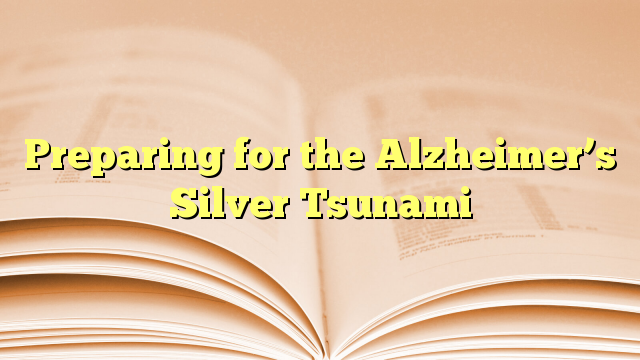In 2011, Baby Boomers began turning 65 at the rate of 10,000 per day. This trend, which many call the Silver Tsunami, will continue for the next 20 years and will have a major impact on our economy, workforce, insurance and healthcare systems.
At present, someone in the United States is diagnosed with Alzheimer’s every 69 seconds. By mid-century, as Boomers continue to age, that number will increase to every 33 seconds.
At present, there is no cure, no long-range treatment, and no proven way to prevent Alzheimer’s. How, then, can we prepare for the impact of the Alzheimer’s Silver Tsunami?
• Increase Your Understanding of Alzheimer’s In recent years, with celebrities like musician Glen Campbell and University of Tennessee women’s basketball head coach Pat Summit bringing Alzheimer’s into the public eye, there has been increased awareness of the disease. However, awareness doesn’t always mean understanding.
It has been my experience, that there is still a considerable amount of misunderstanding about Alzheimer’s. I am frequently asked: “I understand they lose their keys or forget a name. I do that – so what’s the big deal?” I begin by explaining it isn’t just about forgetting a name or where they placed their keys. Alzheimer’s is a progressive, terminal disease which will ultimately impact every part of the individual’s brain – which will ultimately impact every part of the individual – and their family’s – life.
Increased understanding also helps remove some of the stigma which still surrounds Alzheimer’s. Many families won’t talk about “it” out of fear the public perception of their loved one will be that he/she is ‘crazy’. By bringing the disease out of the dark and into the light through education and understanding, we can begin moving forward in how to help these individuals, their families and caregivers.
• Increased and Earlier Diagnosis Increased understanding also means being aware of the symptoms of Alzheimer’s. It’s important to note there are diseases (some treatable) whose symptoms can mimic Alzheimer’s.
The sooner an individual and their family know exactly what they are dealing with, the sooner they and caregiving team (family, friends, physician, attorney, financial planner, etc.) can put a plan in place for their short-term and long-range health and care.
While the average life expectancy after diagnosis is eight years, there are individuals who have survived up to 20 years. Getting a diagnosis, getting support and having a plan will help ensure the individual is cared for in a manner they desire.
• Support the Caregiver (Family and Professional) Until there is a cure, proven treatment or way to prevent Alzheimer’s, it’s critical for caregivers (both family and professional) to receive training in how to care for someone with Alzheimer’s.
The majority of those diagnosed with Alzheimer’s are cared for by a family member (particularly in the early to middle stages of the disease) – and often without adequate knowledge or skills. An older adult caring for a loved one with Alzheimer’s has a 60% change of dying before their loved one due to the stress caregiving has on their own health.
There are many techniques both family and professional caregivers can be shown (i.e., knowing what triggers to look for to reduce or eliminate behaviors, understanding and addressing repetitive questions or requests, etc.) which can empower caregivers and make the caregiving journey more joyful and less stressful for everyone.
Blog content provided by Patti Kerr, CAEd, a Certified Alzheimer’s Educator, keynote speaker, and the author of I Love You, Who Are You? Loving and Caring for a Parent with Alzheimer’s. You can reach her through her website: www.pattikerr.com



